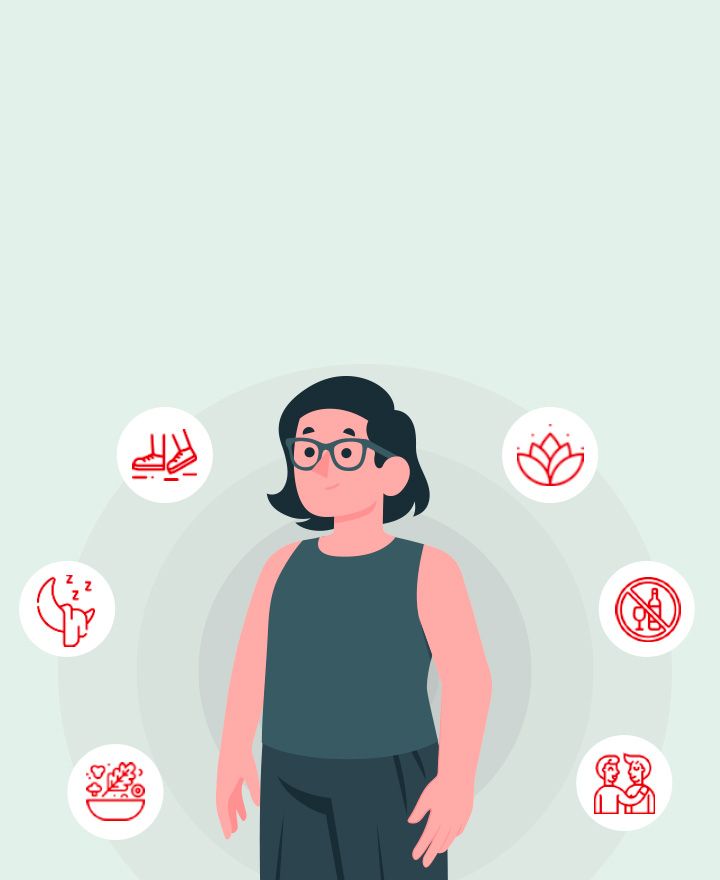

Hot Flashes: Diagnosis & Treatment
A common yet spontaneous experience, hot flashes are sudden waves of heat, sometimes accompanied by night sweats. They can disrupt your daily life and even impact your overall well-being. Hot flashes happen due to several underlying medical conditions and understanding why they occur is crucial. Menopause, allergies, medications, and certain diseases are the primary cause of hot flashes. This guide will help you to understand the reason behind hot flashes and how to treat and diagnose them effectively.
Diagnosis
Depending on the symptoms, the doctor will diagnose this health condition.
• For women going through menopause, a blood test will be conducted by the gynaecologist to identify whether menopause is a major reason behind your hot flashes.
• For those who are not in the menopause transition, the diagnosis will depend on the signs and symptoms.
Treatment
1. Hormone Therapy
• Oestrogen is a key hormone used to alleviate hot flashes, with addition of progesterone to prevent endometrial cancer.
• Doctors suggest personalised hormone therapy to balance oestrogen and progesterone with an emphasis on the smallest effective dose for symptom control.
2. Antidepressants
• Your doctor may suggest FDA-approved non-hormonal treatment options or antidepressants that are considered for managing hot flashes in women unable to use hormones.
• Effectiveness may vary, and potential side effects include nausea, difficulty sleeping, weight gain, dry mouth, or sexual dysfunction.
3. Nerve Block Procedure
• Depending on the severity of hot flashes and your health condition, doctors can advise you for a nerve block procedure known as stellate ganglion block.
• An anaesthetic is injected into a neck nerve cluster to alleviate pain; although this treatment option shows promise for severe hot flashes, more research is needed.
• One may experience potential side effects, including pain and bruising at the injection site.
• Consulting a doctor for appropriate treatment to reduce the symptoms of hot flashes is prudent.
4. Self-Care
Self-Care tips while coping with hot flashes include:
• Understand your body’s exact signs and symptoms to identify whether hot flashes are due to menopause.
• Stay hydrated
• Avoid wearing black-coloured or tight clothes to prevent heat absorption in your body.
• Avoid spicy foods that trigger thermogenic effects. Hot foods will ultimately generate heat in your body.
• Maintain a normal BMI or healthy weight by embracing a nutritious diet.
• Avoid drinking caffeinated beverages and alcohol.
• Stop smoking to reduce hot flashes.
• Practice mindfulness or mind-body therapies like guided imagery, meditation, stress management techniques, and slow and deep breathing exercises. These therapies may not be too beneficial, but they can ease sleep disturbances usually associated with menopause.
Alternative Medicine
1. Herbal Remedies
• It is believed by some people that certain herbs such as red clover, black cohosh, and dong quai can help alleviate hot flashes. However, consult a healthcare provider before you include these in your diet, as there is limited scientific evidence establishing their efficacy.
2. Soy and Isoflavones
• Soy-based products contain natural compounds called isoflavones, which may offer relief.
• Some studies suggest a potential reduction in hot flashes.
3. Vitamin E
• Antioxidant properties of vitamin E may contribute to symptom relief.
• Consultation with a healthcare provider is advisable, as high doses can have risks.
4. Homeopathy
• It uses highly diluted medicines to stimulate the body's healing response.
• There is limited scientific evidence on homoeopathy's effectiveness for hot flashes, but consult with a qualified homoeopathic practitioner for an effective strategy.
Specific techniques, like cognitive behavioural therapy (CBT), mindfulness meditation, and acupuncture, may help ease the symptoms associated with hot flashes.
Conclusion
Hot flashes are a common health condition and usually go away after appropriate medical intervention. The condition is not dangerous; however, if you are experiencing rapid heartbeats or fluctuations in blood pressure, consult your doctor as soon as possible.
One of the important components of our overall wellness is also being financially secured. Healthcare emergencies can happen any time, but a good health insurance policy can protect you from such uncertain situations. To know more about Wellness and other health related tips, visit the wellness corner.
Source: mayoclinic.org, my.clevelandclinic.org, webmd.com, nia.nih.gov
Disclaimer: This blog provides general information and discussions about health and related subjects. The information and other content provided in this blog, website or in any linked materials are not intended and should not be considered, or used as a substitute for, medical advice, diagnosis or treatment. Kindly contact your Doctor before starting a new medicine or health regime.
Related Articles
Combat Hot Flashes - Effective Home Remedies
Health Improvement Tips for Women of Any Age
Health and Age-Related Changes You Must Know
10 Mistakes Women Are Making in Their Health and Fitness
Here Are Some Healthy Aging Tips for Women
Published on March 05, 2024














 Car Insurance
Car Insurance  Bike/Two Wheeler Insurance
Bike/Two Wheeler Insurance  Health Insurance
Health Insurance  Pet Insurance
Pet Insurance  Travel Insurance
Travel Insurance  Home Insurance
Home Insurance  Cyber Insurance
Cyber Insurance  Third Party Vehicle Ins.
Third Party Vehicle Ins.  Tractor Insurance
Tractor Insurance  Goods Carrying Vehicle Ins.
Goods Carrying Vehicle Ins.  Passenger Carrying Vehicle Ins.
Passenger Carrying Vehicle Ins.  Compulsory Personal Accident Insurance
Compulsory Personal Accident Insurance  Travel Insurance
Travel Insurance  Rural
Rural  Critical illness Insurance
Critical illness Insurance